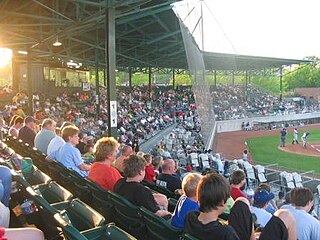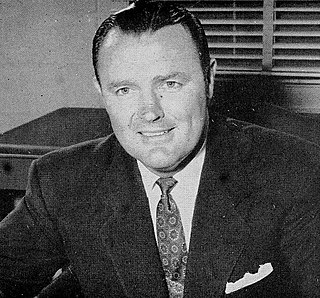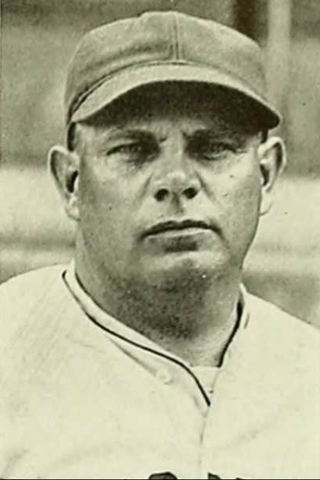
Snow Hill is a town in Greene County, North Carolina, United States. The population was 1,595 at the 2010 census. It is the county seat of Greene County and is part of the Greenville Metropolitan Area. Snow Hill hosts numerous tennis tournaments during the year. Snow Hill is home to the Green Ridge Racquet Club. Many junior players and adults travel to Snow Hill in order to play in the USTA Sanctioned tournaments.

The Kinston Indians were a Minor League Baseball team of the Carolina League (CL) located in Kinston, North Carolina, from 1978 to 2011. They played their home games at Grainger Stadium, which opened in 1949.

Grainger Stadium is a sports venue located in Kinston, North Carolina. It is the home ballpark for the Down East Wood Ducks, which joined the Carolina League starting in the 2017 season, and was placed in the Low-A East for only the 2021 season. Grainger was previously home to the Kinston Indians and all the professional Kinston baseball teams since 1949.

The Coastal Plain League (CPL) is a wood-bat collegiate summer baseball league, featuring college players recruited from throughout the nation. The league takes its name from the Class D level Coastal Plain League which operated in the area from 1937 to 1952.

James Moore "Big Jim" Tatum was an American football and baseball player and coach. Tatum served as the head football coach at the University of North Carolina at Chapel Hill, the University of Oklahoma (1946), and the University of Maryland, College Park (1947–1955), compiling a career college football record of 100–35–7. His 1953 Maryland team won a national title. As a head coach, he employed the split-T formation with great success, a system he had learned as an assistant under Don Faurot at the Iowa Pre-Flight School during World War II. Tatum was also the head baseball coach at Cornell University from 1937 to 1939, tallying a mark of 20–40–1. Tatum's career was cut short by his untimely death in 1959. He was inducted into the College Football Hall of Fame as a coach in 1984.
The Coastal Plain League was a Minor league baseball affiliated circuit which, except for the war years (1942–1945), operated in North Carolina between 1937 and 1952. It was classified as a "D" league. It grew out of a semi-pro league that operated from 1935 to 1936 under the same Coastal Plain League name. Today, the summer collegiate baseball league has adopted the Coastal Plain League moniker.

Charles Bunn "Bunny" Hearn was a Major League Baseball pitcher, Major League scout, and minor league, semi-pro and college-level manager.
The Eastern Carolina Baseball Association was a six team minor league baseball affiliation which operated in the Eastern part of North Carolina. The league was considered to be an "outlaw" league since it existed outside of the law of the National Association.
Douglas Clyde "Peahead" Walker was an American football and baseball player, and coach of American football, Canadian football, basketball, and baseball. Walker served as the head football coach at Atlantic Christian College—now Barton College—in 1926, at Elon University from 1927 to 1936, and at Wake Forest University from 1937 to 1950, compiling a career college football record of 127–93–10. At Elon, Walker was also the head basketball coach (1927–1937) and the head baseball coach (1928–1937). In 1952 Walker moved to the Canadian Football League (CFL) to become the head coach of the Montreal Alouettes. He remained with the team until 1959, tallying a mark of 59–48–1 in eight seasons. Walker also played minor league baseball with a number of clubs between 1921 and 1932. He managed the Snow Hill Billies of the Coastal Plain League from 1937 to 1939.

Clarence Campbell, better known as Soup Campbell was a backup outfielder in Major League Baseball who played from 1940 through 1941 for the Cleveland Indians. Listed at 6 ft 1 in (1.85 m), 188 lb., Campbell batted left-handed and threw right-handed. He was born in Sparta, Virginia. In a two-season career, Campbell was a .246 hitter (96-for-432) with three home runs and 37 runs batted in in 139 games, including 10 doubles, four triples, one stolen base, and a .315 on-base percentage.
In North Carolina, Down East refers to two areas of Eastern North Carolina. The first is the historical group of coastal communities east of Beaufort in Carteret County. The second is anywhere east of I-95 in North Carolina in the coastal plain region.
The Mount Airy Graniteers were a minor league baseball Class D team that represented the city of Mount Airy, North Carolina. The team played under two different names in two leagues over their 13 non-consecutive seasons spanning 1934–1950. The club joined the Bi-State League for the 1934 season. In 1935, the Graniteers changed its name to the Mount Airy Reds and continued to operate in the league through 1937.
The Kinston Eagles were a Minor League Baseball team of the Coastal Plain League. They were located in Kinston, North Carolina. The team played its home games at Grainger Stadium, which opened in 1949 and holds 4,100 fans. Prior to that they played in Grainger Park.
The Greenville Greenies was the primary moniker of the minor league baseball teams based in Greenville, North Carolina between 1928 and 1951. Greenville teams played as members of the Eastern Carolina League from 1928 to 1929 and Coastal Plain League from 1934 to 1941 and 1946 to 1951.
Tarboro Tars was the primary name of a minor league baseball team based in Tarboro, North Carolina. The team competed in the Coastal Plain League from 1937 to 1941 and from 1946 to 1952. The team used several other nicknames during its history, and had brief affiliations with the Boston Red Sox and Philadelphia Athletics of Major League Baseball.
The Snow Hill Billies was a minor league baseball team based in Snow Hill, North Carolina. From 1937 to 1940, the Snow Hill Billies played exclusively as members of the Coastal Plain League, winning the 1937 league championship. The Billies played home minor league games at Snow Hill Park.
The Ayden Aces were a minor league baseball team based in Ayden, North Carolina. In 1937 and 1938, the Aces played as exclusively as members of the Class D level Coastal Plain League, hosting home games at the Ayden High School Park.
The Williamston Martins were a minor league baseball team based in Williamston, North Carolina. From 1937 to 1941, the Martins played as exclusively as members of the Coastal Plain League, winning the 1939 league championship. Williamston hosted home minor league games at Taylor Field.
The Edenton Colonials were a minor league baseball team based in Edenton, North Carolina. In 1951 and 1952, the Colonials played as members of the Class D level Virginia League in 1951 and Coastal Plain League in 1952, winning the 1952 league championship in their final season of play. The Edenton Colonials hosted home games at the Historic Hicks Field.
The New Bern Bears were a minor league baseball team based in New Bern, North Carolina. Between 1937 and 1952, with a break during World War II, the Bears teams played exclusively as members of the Coastal Plain League, winning three league championships with six playoff appearances. New Bern hosted minor league home games at Kafer Park.